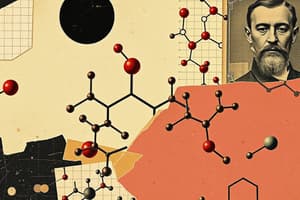Podcast
Questions and Answers
What distinguishes organic compounds from inorganic compounds?
What distinguishes organic compounds from inorganic compounds?
Organic compounds contain carbon atoms.
How many covalent bonds can carbon atoms form?
How many covalent bonds can carbon atoms form?
Four covalent bonds.
What are functional groups?
What are functional groups?
Groups of atoms that influence the properties of molecules.
What process joins monomers to form polymers?
What process joins monomers to form polymers?
ATP stands for ______.
ATP stands for ______.
What are carbohydrates composed of?
What are carbohydrates composed of?
What is a disaccharide?
What is a disaccharide?
What are proteins made up of?
What are proteins made up of?
Enzymes can speed up chemical reactions.
Enzymes can speed up chemical reactions.
What do lipids primarily function as in cells?
What do lipids primarily function as in cells?
What are triglycerides composed of?
What are triglycerides composed of?
What do phospholipids consist of?
What do phospholipids consist of?
Flashcards are hidden until you start studying
Study Notes
Carbon Compounds
- Organic compounds contain carbon and are essential to living organisms, while most inorganic compounds lack carbon.
- Carbon atoms can form four covalent bonds, enabling diverse simple and complex organic compounds.
- Functional groups are specific groupings of atoms that modify molecular properties and influence chemical reactions.
- Condensation reactions link monomers to create polymers, releasing water as a by-product; hydrolysis uses water to break polymers back into monomers.
- Adenosine triphosphate (ATP) serves as an energy currency, storing and releasing energy for cellular functions.
Molecules of Life
- Carbohydrates consist of carbon, hydrogen, and oxygen in a 1:2:1 ratio, providing energy and structural support in organisms.
- Monosaccharides are the simplest carbohydrate units, serving as the building blocks for larger carbohydrates.
- Disaccharides result from the joining of two monosaccharides, while polysaccharides consist of three or more monosaccharides.
- Proteins are complex molecules made primarily of carbon, hydrogen, oxygen, and nitrogen, playing varied roles in structure, defense, and catalysis.
- Amino acids, the monomers of proteins, determine the protein's structure and function based on their sequence.
- A dipeptide forms when two amino acids link through peptide bonds, while a polypeptide is a longer chain of amino acids.
- Enzymes accelerate chemical reactions and bind to specific substrates, altering the enzyme's shape and lowering activation energy.
Lipids
- Lipids are hydrophobic molecules that store energy and are vital components of cell membranes.
- Most lipids contain fatty acids, which have a hydrophilic (water-attracting) end and a hydrophobic (water-repelling) end.
- Triglycerides, a type of lipid, consist of three fatty acids bonded to one glycerol molecule.
- Phospholipids are crucial for cell membranes, comprised of two fatty acids and one glycerol, providing structural integrity.
Studying That Suits You
Use AI to generate personalized quizzes and flashcards to suit your learning preferences.




